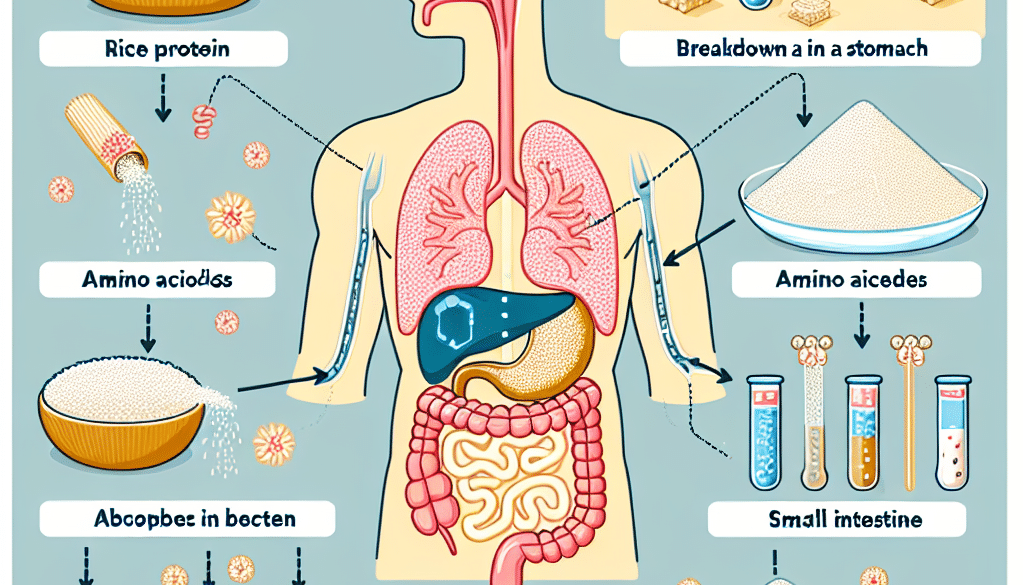Is Rice Protein Absorbed?
-
Table of Contents
- Rice Protein Absorption: A Comprehensive Analysis
- Understanding Protein Absorption
- The Bioavailability of Rice Protein
- Factors Enhancing Rice Protein Absorption
- Comparing Rice Protein to Other Protein Sources
- Case Studies and Research on Rice Protein Absorption
- Conclusion: The Absorption and Efficacy of Rice Protein
- Discover ETprotein’s High-Quality Rice Protein Products
Rice Protein Absorption: A Comprehensive Analysis

Protein is a vital macronutrient essential for building muscle, repairing tissue, and producing enzymes and hormones. While animal-based proteins have long been the go-to source, plant-based proteins are gaining popularity due to dietary preferences, allergies, and environmental concerns. Rice protein, in particular, has emerged as a prominent plant-based alternative. However, a common question among health enthusiasts and those considering plant-based diets is: Is rice protein absorbed effectively by the body? This article delves into the science behind rice protein absorption, its benefits, and how it compares to other protein sources.
Understanding Protein Absorption
Protein absorption is a complex process that involves breaking down protein into amino acids and small peptides, which are then absorbed through the small intestine. The body’s ability to absorb and utilize these amino acids is known as protein bioavailability. Factors influencing protein bioavailability include the source of protein, its amino acid composition, and the presence of anti-nutritional factors that can inhibit absorption.
The Bioavailability of Rice Protein
Rice protein is derived from brown rice and is considered a high-quality protein due to its amino acid profile. It contains all nine essential amino acids, although it is lower in lysine compared to animal proteins. Despite this, studies have shown that rice protein can be effectively absorbed by the body.
- A study published in the Nutrition Journal compared rice protein isolate to whey protein isolate and found that both proteins were equally effective in supporting muscle recovery and growth when taken after resistance training.
- Another research indicated that the digestibility of rice protein is comparable to that of soy, which is often touted as one of the best plant-based protein sources.
These findings suggest that rice protein can be a viable alternative to traditional animal-based proteins, especially for those with dietary restrictions or preferences.
Factors Enhancing Rice Protein Absorption
Several factors can enhance the absorption of rice protein, making it more comparable to animal-based proteins:
- Enzyme Treatment: Treating rice protein with specific enzymes can help break down the protein into a form that’s easier for the body to absorb.
- Amino Acid Supplementation: Combining rice protein with other plant-based proteins or adding lysine can create a more complete amino acid profile.
- Proper Digestion: Ensuring adequate digestive health can improve the body’s ability to absorb proteins from various sources, including rice.
Comparing Rice Protein to Other Protein Sources
When comparing rice protein to other protein sources, it’s important to consider several aspects:
- Amino Acid Profile: Rice protein has a good amino acid profile but may require supplementation with lysine to match the profile of animal proteins.
- Digestibility: Animal proteins are generally more digestible than plant proteins, but rice protein is one of the more digestible plant proteins available.
- Allergenic Potential: Rice protein is hypoallergenic, making it a suitable option for individuals with allergies to dairy, soy, or gluten.
These comparisons indicate that while rice protein may have some limitations, it remains a competitive option in the protein supplement market.
Case Studies and Research on Rice Protein Absorption
Several case studies and research projects have focused on the absorption and efficacy of rice protein:
- A study by the Journal of the International Society of Sports Nutrition found that rice protein isolate consumption post-workout provided the same recovery and muscle growth benefits as whey protein.
- Research on the digestibility of plant proteins has shown that rice protein is among the most digestible, with a score close to that of animal proteins.
These studies reinforce the potential of rice protein as an effective supplement for athletes and those seeking to increase their protein intake.
Conclusion: The Absorption and Efficacy of Rice Protein
In conclusion, rice protein is a viable and effective plant-based protein source. Its absorption is comparable to other high-quality protein sources, especially when enhanced with enzyme treatment or combined with other proteins to improve its amino acid profile. With its hypoallergenic nature and sustainability benefits, rice protein is an excellent choice for a wide range of individuals, including athletes, vegans, and those with specific dietary needs.
Discover ETprotein’s High-Quality Rice Protein Products
If you’re looking for a reliable source of high-quality rice protein, ETprotein offers a range of products that cater to various needs. Their organic rice protein is characterized by a neutral taste, non-GMO, and allergen-free attributes, making it an ideal choice for those seeking a clean and sustainable protein source. With a commitment to quality and customer satisfaction, ETprotein is a trusted supplier for consumers and businesses alike.
About ETprotein:
ETprotein, a reputable protein and L-(+)-Ergothioneine (EGT) Chinese factory manufacturer and supplier, is renowned for producing, stocking, exporting, and delivering the highest quality organic bulk vegan proteins and L-(+)-Ergothioneine. They include Organic rice protein, clear rice protein, pea protein, clear pea protein, watermelon seed protein, pumpkin seed protein, sunflower seed protein, mung bean protein, peanut protein, and L-(+)-Ergothioneine EGT Pharmaceutical grade, L-(+)-Ergothioneine EGT food grade, L-(+)-Ergothioneine EGT cosmetic grade, L-(+)-Ergothioneine EGT reference grade and L-(+)-Ergothioneine EGT standard. Their offerings, characterized by a neutral taste, non-GMO, allergen-free attributes, with L-(+)-Ergothioneine purity over 98%, 99%, cater to a diverse range of industries. They serve nutraceutical, pharmaceutical, cosmeceutical, veterinary, as well as food and beverage finished product distributors, traders, and manufacturers across Europe, USA, Canada, Australia, Thailand, Japan, Korea, Brazil, and Chile, among others.
ETprotein specialization includes exporting and delivering tailor-made protein powder and finished nutritional supplements. Their extensive product range covers sectors like Food and Beverage, Sports Nutrition, Weight Management, Dietary Supplements, Health and Wellness Products, and Infant Formula, ensuring comprehensive solutions to meet all your protein needs.
As a trusted company by leading global food and beverage brands and Fortune 500 companies, ETprotein reinforces China’s reputation in the global arena. For more information or to sample their products, please contact them and email sales(at)ETprotein.com today.












